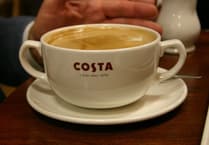Walk into some of the top restaurants in New York or California and the chances are you’ll find Wagyu beef on the menu.
Wagyu literally means ’Japanese beef’, as the breed is native to Japan.
The meat has distinctive marbling running right through it, which gives a flavour so rich that the typical serving size is smaller than a regular steak.
The fat in the marbling also dissolves at a lower temperature than typical beef so it literally melts in your mouth.
It’s healthy too: the marbling is rich in omega-3 and omega-6, improving the ratio of monounsaturated fats compared with regular beef.
It is also eye-wateringly expensive, one serving costing up to $200 in New York restaurants.
A few years ago Chris Kneale, who raises beef cattle in Jurby, decided that Wagyus might do very well in the Isle of Man.
Chris has always been ready to try something new: he was the first to grow quinoa on the island.
And because he also has more than 10 years’ experience working as an agricultural consultant, you can be sure that his ideas are properly thought through.
The idea in this instance was to inseminate dairy cows with Wagyu semen and buy the resulting calves after weaning to rear himself.
He would guarantee at the outset to take the calves at a fixed price which would mean everyone could plan their costs.
Chris says: ’Nobody else was doing it and I saw an opportunity to work with the dairy industry to try and generate a high-value product.’
Chris imported the semen and Vicky and Neil Sloane Masson, who farm at Ronague, provided some of the cows from their Holstein dairy herd.
They started with only three born last year and Chris says this first crop is ’doing very well’.
Vicky and Neil now have this year’s calves, 10 of them this time, nearly ready to go.
Vicky explains that it is not the first time their dairy cows have been crossed with other breeds: ’We do that for two other farmers who supply the breeds that they want so we have done British Blue and Hereford crosses too.’
It works well for dairy farmers who need their cows to be pregnant each year in order to give milk but don’t need all the progeny, and certainly don’t need the bull calves.
When they are producing calves for other farmers Vicky and Neil work out the best time of year and batch them all up so they’re a similar age.
DEFA runs the importation of semen service and has strict criteria regarding the quality of semen with only certain sires approved.
Vicky says: ’The department delivers the straws [frozen semen] and then I just artificially inseminate them and take them to weaning.
’Then they’re ready for Chris to do the next process to rear them on.’
As with her own calves, Vicky’s regime is meticulous, designed to give them the very best start in life.
She says: ’It’s the most important part of their life really, from birth to weaning. If you get that wrong it’s a job to get it back.
’So everything needs to be done properly with the colostrum management.
’We test the mother’s colostrum to make sure there’s enough haemoglobins in her milk and if it doesn’t come through as a good haemoglobin level then we’ll use either some I’ve frozen from a cow that has a good level or use powdered colostrum.
’If you give them that first feed then you know that the first thing that hits their stomach is the proper stuff, rather than going round the pens eating straw and bits of muck and things they shouldn’t be eating, so you get no health problems then.’
When they go up to Chris’s farm in Jurby his plan is for them to be mostly grass fed which is very different from the typical rearing they would experience in Japan.
There, due to the limited amount of land, they are usually kept inside where they live a life that can only be described as five star: they are given beer (to enhance their appetite) and listen to music while they eat.
The farmers also massage them - sometimes, apparently, with sake - to keep them stress-free, which they believe helps with the marbling.
When Chris’s cows are ready, in a few years’ time, he plans to market the beef himself: ’I’ve already had people express an interest, both in the Isle of Man and further afield,’ he says.
It should be a win-win situation for both him, with a premium beef product as the outcome, and the Sloane Massons. As Vicky says: ’It’s good diversification for us. We didn’t want to diversify away from the farm - we’ve got to make money from what we’ve got.’




-(2).jpeg?width=209&height=140&crop=209:145,smart&quality=75)
Comments
This article has no comments yet. Be the first to leave a comment.